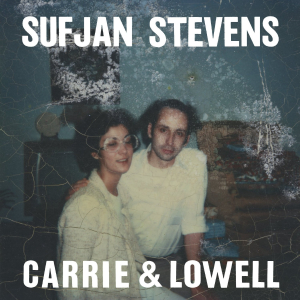These
11 tunes are expressions of woes that you can’t quite correct but can’t
let go, either, worries that plague you but push you onward, too. These
are public folk songs about the private problems—breakups and makeups,
depressions and deaths—we’ve all suffered.
9. Tame Impala - Currents
(45 point)
There's
a half-remembered quality to Kevin Parker's songs for Tame Impala.
Melodies and rhythms arrive in thunderclaps — carefully orchestrated or
artfully accidental — or float by in soothing clouds. These are the
epiphanies and freakouts of decades past: soul, space rock, nerd funk,
studio-whiz pop. You feel sure you recognize something, but you don't
quite know from where or when.
8. Destroyer - Poison Season
(50 point, 1 førsteplads)
His
wit and intelligence as a songwriter remain intact as always and he
beds his prose and wry lyricism in a garden of swooning instrumentation
that feels refreshingly intricate in an indie genre overcrowded with
clashing chords and overly direct choruses.
7. Deerhunter - Fading Frontier
(51 point, 2 førstepladser)
Nevertheless,
the optimism bubbling under the melancholy makes Fading Frontier all
the more affecting. "Living My Life" is one of Deerhunter's most gently
joyous-sounding songs yet, a blissful synth pop reverie that caresses
where Monomania sneered. And while "Carrion"'s reflections on enduring
endings aren't exactly happy, their resilience is emblematic of Fading
Frontier as a whole: Musically and emotionally, this is one of
Deerhunter's most powerful -- and delicate -- albums.
6. Fede Poul - Fede Poul I Centeret
(53 point)
det vil ingen ende tage, muligvis det bedste mixtape i historien.
5. Jamie xx - In Colour
(56 point)
The
platonic ideal of the dancefloor, which is obviously never quite
fulfilled, is that the dancers meet as equals. Everyone is on their own
journey and there is no judgement, and the right drugs at the right time
have helped to bring this starry-eyed vision to life. Jamie xx’s music
captures some of this spirit by being terribly hip and of-the-moment but
also deeply emotional. It’s "cool" music designed to make you feel, and
the mechanism is vulnerability.
4. Grimes - Art Angels
(58 point)
there's
something v nourishing about it, a source of power I have been
continually diving into. it's both hugely expansive in the range it
covers and incredibly dense and fast-paced, she really charges through
it – the percussion is the key secret ingredient giving it a radio/dj
set energy – & the whole thing is such a blast, it's been something
I've just played it over and over (and I'm not really the looping type)
3. Father John Misty – I Love You, Honeybear
(74 point, 1 førsteplads)
In
eschewing the espoused grittiness of indie rock for meticulous pomp,
Tillman ensures that I Love You, Honeybear isn't easily digestible; its
protagonist is aggressively self-loathing, and the sonic palette is
sometimes intentionally hokey to the point of distraction. But Tillman's
world, with its romantic fatalism, rampant drug abuse, and smart-ass
asides, presents an authentic and enthralling character study that makes
a compelling case for this aimless fake drifter as a decent, vulnerable
person. It's a rare fulfillment of outsized ambition and a
crystallization of Tillman's inimitable narrative verve, however
unreliable his narrator may be.
2. Kendrick Lamar - To Pimp A Butterfly
(75 point, 3 førstepladser)

What
I admire most and enjoy most about this album is that it addresses
African-Americans straight up and leaves the rest of the hip-hop
audience to listen in if it wants. It’s a strong, brave, effective bid
to reinstate hip-hop as black America’s CNN — more as op-ed than front
page, but in the Age of Twitter that’s the hole that needs filling.
Fortunately, the concept starts with the music, which eschews party
bangers without foregoing groove, sampling rhythm godfathers P-Funk,
Michael Jackson, and the Isley Brothers and building a house band around
jazz pianist Robert Glasper and what-you-got bassist Thundercat. But
it’s even more racially explicit in lyrics that don’t protest racism
because what good does that ever do — just assumes it as a condition of
life for his people, root cause of the cultural breakdowns he laments
and preaches against throughout. Acknowledged only in passing is a
mega-success too obvious to go on about, not to mention enjoy — a
privilege that’s also a temptation, to which he responds not with hater
paranoia but with a depressive anxiety that resurfaces as a narrative
hook without ever starting a pity party. Lamar knows he’s got it good.
For his people he wants better. Few musicians of any stylistic
persuasion are so thoughtful or so ardent. Few musicians have so little
need of a hooky review.
1. Sufjan Stevens - Carrie & Lowell
(84 point, 2 førstepladser)
Stevens
has always channelled his inner child: the result has often been
wonderful but occasionally annoying. Here that child is disarmingly
exposed. He clings to hazy recollections of the few happy holidays he
spent with his mother and stepfather, Lowell, to whom she was married
for five years and with whom Stevens remains close. He has always
mythologised his personal life in song, but Carrie’s death forces him to
face facts: Perseus and Medusa mingle with the modern pharmacological
god Thorazine (an anti-psychotic) in a world of hospital procedures.
“When
I was three, three maybe four/ She left us at that video store,” he
sings on Should Have Known Better. It’s a song that flutters around
difficult memories until taking a surprising – and very deliberate –
uplifting turn in the final third as a keyboard flushes hope through a
warm and inclusive new melody that welcomes listeners into Stevens’s
catharsis even as the lyrics remain specific to him.
At every
turn he unfolds the fists of self-pity into upturned palms of
generosity. Accepting that a part of him will always be “lost in your
sleeve where you hid your cigarettes”, he forgives his mother.






Ingen kommentarer:
Send en kommentar